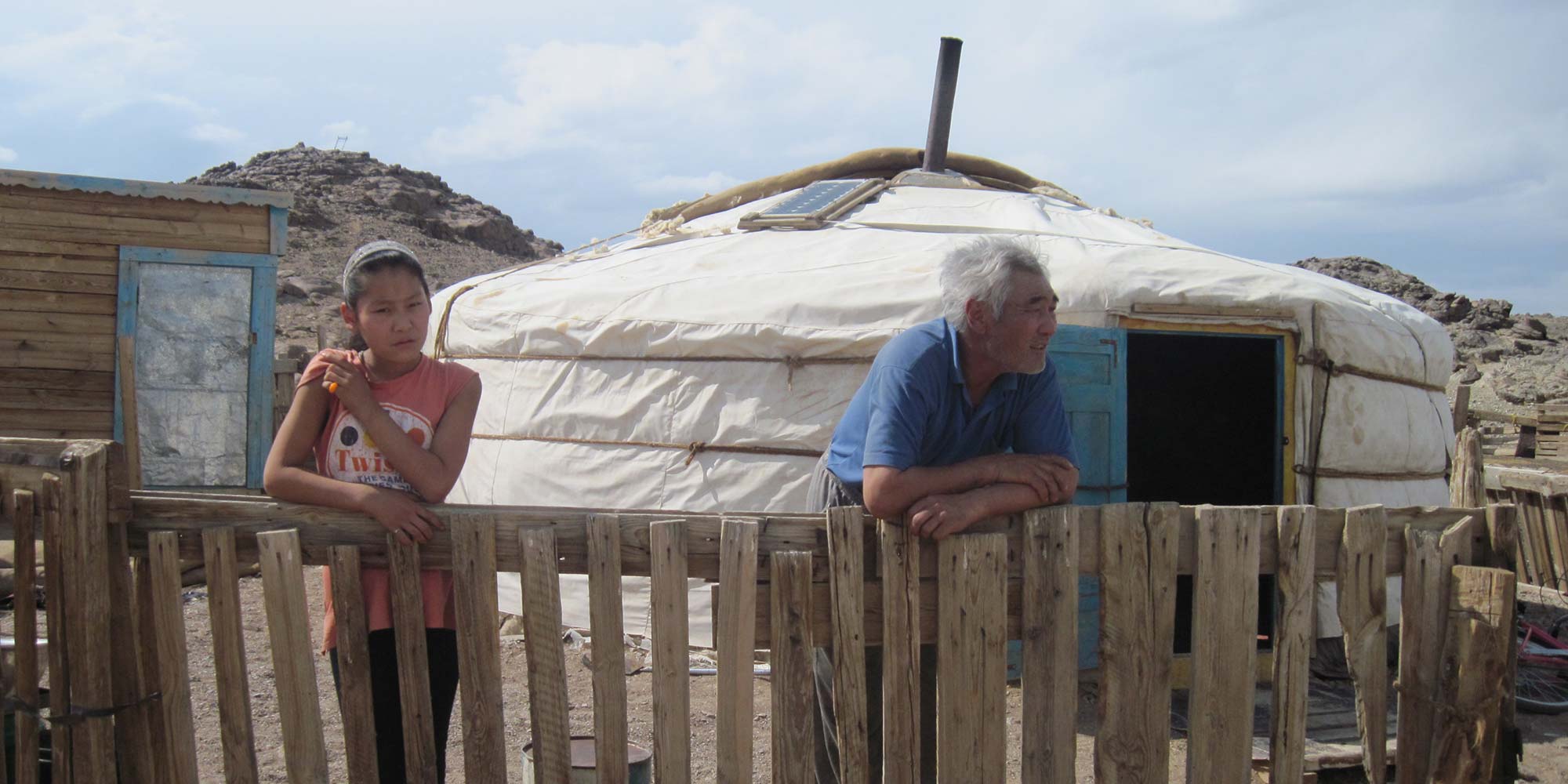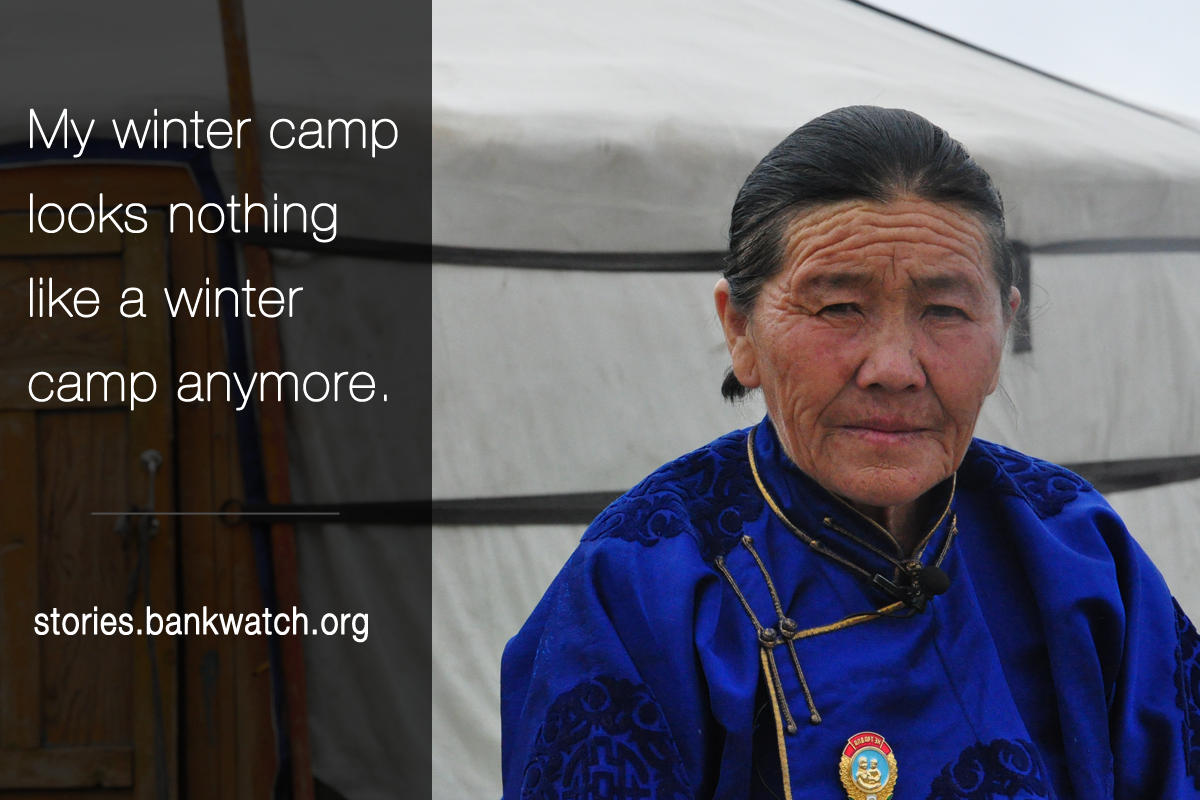ARCHIVED: Mining boom in Mongolia
With huge amounts of unexploited natural resources (gold, copper, coal and more) the Mongolian economy is estimated to grow massively in the years to come. But will it also benefit the people in Mongolia? Our work shows how mining operations lead to pollution and displacement for local herders and exacerbate water scarcity issues.

Father and daughter, resettled by Oyu Tolgoi
Stay informed
We closely follow international public finance and bring critical updates from the ground.
Background
With huge amounts of unexploited natural resources (gold, copper, coal and more) the Mongolian economy is estimated to grow massively in the years to come. But will it also benefit the people in Mongolia? Our work shows how mining operations lead to pollution and displacement for local herders and exacerbate water scarcity issues.
Dust, displacement and intimidation in the Gobi Altai mountains
Nomadic herders in the Gobi Altai mountains are facing pollution and displacement by the Tayan Nuur iron ore mine that receives financing from the European Bank for Reconstruction and Development.
While the mining company Altain Khuder responds to criticism with intimidation, the EBRD is not doing enough to protect herders’ rights.
Read more:
When the dust settles
A multimedia story about herders impacted by the Tayan Nuur mine
Dust, displacement, intimidation – Mongolian herders are under pressure by iron ore mine
Blog post | December 9, 2014
Report: Impacts of the Tayan Nuur iron ore mine on nomadic herders’ lives in Mongolia
Study | December 9, 2014
Case study on the impacts of the global iron ore sector: Altain Khuder in Mongolia
SOMO case study | December 17, 2014
Water scarcity in the South Gobi desert
In the South Gobi desert, the highly intensive mining industry with its immense need for water can pose precarious risks to the livelihoods of herders.
Read more
Spirited away – Mongolia’s mining boom and the people that development left behind (pdf)
Study | January 30, 2012
EBRD financing for mining in Mongolia
By financing several mining projects over the last few years, the EBRD followed other investors’ bias towards the natural resources sector in Mongolia. Instead, it should diversify its portfolio in the country to help Mongolia reduce its dependency on commodity exports.
Read more:
The EBRD in Mongolia: Economic diversity is something else
Blog post | September 18, 2012
Online debate
Following a discussion in the European Parliament on the EBRD’s mining operations, Bankwatch organised a live-streamed google hangout with Mongolian campaigner Sukhgerel Dugersuren.
Latest news
EU green dream is a harsh reality for metal-rich countries
Bankwatch in the media | 24 March, 2021The tale of Mongolia’s Oyu Tolgoi copper mine highlights the potential toll on people and the environment in Central Asia from Europe’s rush for high-tech climate solutions. Source: EU green dream is a harsh reality for metal-rich countries
Read moreDer Widerstand gegen Bergbau-Großprojekte in der Mongolei: Zehntausende sind aktiv » LabourNet Germany
Bankwatch in the media | 5 March, 2021Wer hierzulande an die Mongolei denkt, denkt meistens in Schablonen-Mustern: Reitervolk, Dschengis (der große) Khan (dessen „Goldene Horde …
Read moreDoing the same thing and expecting different results: Mongolia plans to curb air pollution with more coal
Blog entry | 3 May, 2017A new law on air pollution recently adopted by the Mongolian government is in part the result of massive demonstrations against air pollution in the capital. The new policy, however, involves even more reliance on coal.
Read moreRelated publications
Letter to EBRD: request to clarify conflicting information on mining projects in Mongolia
Advocacy letter | 23 March, 2012 | Download PDFFollowing a fact-finding mission to Mongolia in June 2011, CEE Bankwatch sent a letter on August 18, 2011 with several questions for clarification to the EBRD. Additionally OT Watch submitted a paper on November 1, 2011 to representatives of the EBRD Board of Directors during their visit to Mongolia. While the EBRD replied to both of these, several issues still need clarification, as there is conflicting information.
Silence is golden for some – the strange case of the EBRD’s mining policy
Bankwatch Mail | 13 March, 2012 |It is coming up for three years since the EBRD’s 2009 Annual Evaluation Overview Report “alerted Management to develop a new Operation Policy to cover all forms of non-energy related extraction of natural resources (mining policy)”. The EBRD does not appear to have been in any great rush with the preparation of this policy, and one has to wonder how long the bank will allow for the new policy to be consulted with the interested public. More importantly, how influential will public input be in setting the policy objectives and requirements?
Spirited away – Mongolia’s mining boom and the people that development left behind
Study | 30 January, 2012 | Download PDFThe report, based on a fact finding mission to the Tavan Tolgoi and Oyu Tolgoi mines in Mongolia, examines the social and environmental impacts of mining in Mongolia. It offers a more in-depth look at the impacts on herders who have been displaced by the mining operations, the local effects of the construction of infrastructure and the mining operations themselves.

